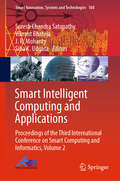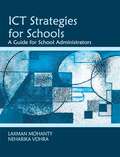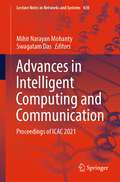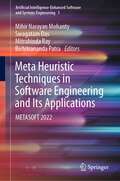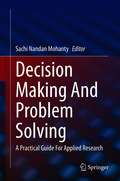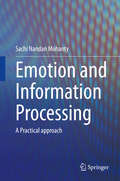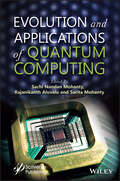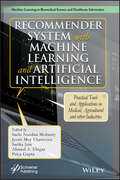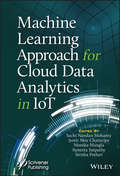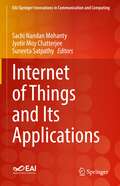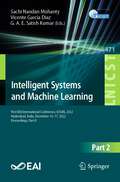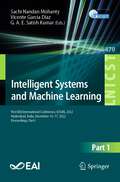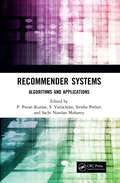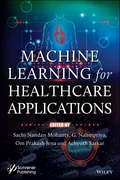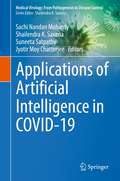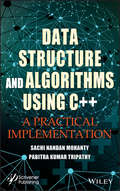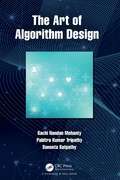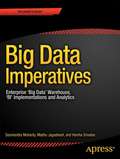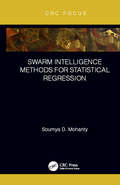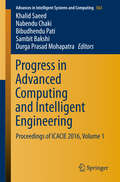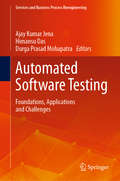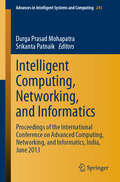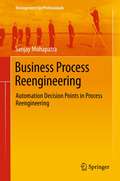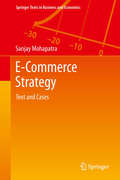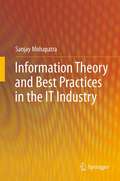- Table View
- List View
Smart Intelligent Computing and Applications: Proceedings of the Third International Conference on Smart Computing and Informatics, Volume 2 (Smart Innovation, Systems and Technologies #160)
by J. R. Mohanty Suresh Chandra Satapathy Vikrant Bhateja Siba K. UdgataThis book presents high-quality papers from the Third International Conference on Smart Computing and Informatics (SCI 2018−19), organized by the School of Computer Engineering and School of Computer Application, Kalinga Institute of Industrial Technology Deemed to be University, Bhubaneswar, from 21 to 22 December 2018. It includes advanced and multi-disciplinary research on the design of smart computing and informatics, focusing on innovation paradigms in system knowledge, intelligence and sustainability that have the potential to provide realistic solutions to various problems in society, the environment and industry. The papers featured provide a valuable contribution to the deployment of emerging computational and knowledge transfer approaches, optimizing solutions in varied disciplines of science, technology and health care.
ICT Strategies for Schools: A Guide for School Administrators
by Laxman Mohanty Neharika VohraRecognizing the potential of ICTs to make the classroom transaction of curriculum significantly more relevant and purposeful, principals and school administrators in India need to design appropriate IT strategies and oversee the entire implementation process in their schools. This book is guide to the use of ICT in schools, covering issues of pedagogy, curriculum and learning. In brief, it deals with - Education uses of IT - Criteria for selection of hardware and software - Designing an IT-assisted curriculum - Teacher recruitment, training and desired competencies - Management and financial issues - Possible problem areas: plagiarism, privacy, hacking Lucidly written, with case studies highlighting successful strategies, this volume will be of immense importance to principals and administrators of schools as also students of education.
Advances in Intelligent Computing and Communication: Proceedings of ICAC 2021 (Lecture Notes in Networks and Systems #430)
by Mihir Narayan Mohanty Swagatam DasThe book presents high-quality research papers presented at 4th International Conference on Intelligent Computing and Advances in Communication (ICAC 2021) organized by Siksha ‘O’ Anusandhan, Deemed to be University, Bhubaneswar, Odisha, India, in November 2021. This book brings out the new advances and research results in the fields of theoretical, experimental, and applied signal and image processing, soft computing, networking, and antenna research. Moreover, it provides a comprehensive and systematic reference on the range of alternative conversion processes and technologies.
Meta Heuristic Techniques in Software Engineering and Its Applications: METASOFT 2022 (Artificial Intelligence-Enhanced Software and Systems Engineering #1)
by Mihir Narayan Mohanty Swagatam Das Mitrabinda Ray Bichitrananda PatraThis book discusses an integration of machine learning with metaheuristic techniques that provide more robust and efficient ways to address traditional optimization problems. Modern metaheuristic techniques, along with their main characteristics and recent applications in artificial intelligence, software engineering, data mining, planning and scheduling, logistics and supply chains, are discussed in this book and help global leaders in fast decision making by providing quality solutions to important problems in business, engineering, economics and science. Novel ways are also discovered to attack unsolved problems in software testing and machine learning. The discussion on foundations of optimization and algorithms leads beginners to apply current approaches to optimization problems. The discussed metaheuristic algorithms include genetic algorithms, simulated annealing, ant algorithms, bee algorithms and particle swarm optimization. New developments on metaheuristics attract researchers and practitioners to apply hybrid metaheuristics in real scenarios.
Decision Making And Problem Solving: A Practical Guide For Applied Research
by Sachi Nandan MohantyIn Decision Making and Problem Solving: A Practical Guide for Applied Research, the author utilizes traditional approaches, tools, and techniques adopted to solve current day-to-day, real-life problems. The book offers guidance in identifying and applying accurate methods for designing a strategy as well as implementing these strategies in the real world. The book includes realistic case studies and practical approaches that should help readers understand how the decision making occurs and can be applied to problem solving under deep uncertainty.
Emotion and Information Processing: A Practical approach
by Sachi Nandan MohantyThis book consists of thirteen chapters covering many facts like psycho-social intervention on emotional disorders in individuals, impact of emotion and cognition on blended theory, theory and implication of information processing, effects of emotional self esteem in women, emotional dimension of women in workplace, effects of mental thinking in different age groups irrespective of the gender, negative emotions and its effect on information processing, role of emotions in education and lastly emotional analysis in multi perspective domain adopting machine learning approach. Most of the chapters having experimental studies, with each experiment having different constructs as well as different samples for each data collection. Most of the studies measure information processing within altered mood states, such as depression, anxiety, or positive emotional states, with mental ability tasks being conducted in addition to the experiments of quasi-experimental design.
Evolution and Applications of Quantum Computing
by Sachi Nandan Mohanty Rajanikanth Aluvalu Sarita MohantyEVOLUTION and APPLICATIONS of QUANTUM COMPUTING The book is about the Quantum Model replacing traditional computing’s classical model and gives a state-of-the-art technical overview of the current efforts to develop quantum computing and applications for Industry 4.0. A holistic approach to the revolutionary world of quantum computing is presented in this book, which reveals valuable insights into this rapidly emerging technology. The book reflects the dependence of quantum computing on the physical phenomenon of superposition, entanglement, teleportation, and interference to simplify difficult mathematical problems which would have otherwise taken years to derive a definite solution for. An amalgamation of the information provided in the multiple chapters will elucidate the revolutionary and riveting research being carried out in the brand-new domain encompassing quantum computation, quantum information and quantum mechanics. Each chapter gives a concise introduction to the topic. The book comprises 18 chapters and describes the pioneering work on the interaction between artificial intelligence, machine learning, and quantum computing along with their applications and potential role in the world of big data. Subjects include: Combinational circuits called the quantum multiplexer with secured quantum gate (CSWAP); Detecting malicious emails and URLs by using quantum text mining algorithms to distinguish between phishing and benign sites; Quantum data traffic analysis for intrusion detection systems; Applications of quantum computation in banking, netnomy and vehicular ad-hoc networks, virtual reality in the education of autistic children, identifying bacterial diseases and accelerating drug discovery; The critical domain of traditional classical cryptography and quantum cryptography. Audience The book will be very useful for researchers in computer science, artificial intelligence and quantum physics as well as students who want to understand the history of quantum computing along with its applications and have a technical state-of-the-art overview.
Recommender System with Machine Learning and Artificial Intelligence: Practical Tools and Applications in Medical, Agricultural and Other Industries
by Sachi Nandan Mohanty Jyotir Moy Chatterjee Sarika Jain Ahmed A. Elngar Priya GuptaThis book is a multi-disciplinary effort that involves world-wide experts from diverse fields, such as artificial intelligence, human computer interaction, information technology, data mining, statistics, adaptive user interfaces, decision support systems, marketing, and consumer behavior. It comprehensively covers the topic of recommender systems, which provide personalized recommendations of items or services to the new users based on their past behavior. Recommender system methods have been adapted to diverse applications including social networking, movie recommendation, query log mining, news recommendations, and computational advertising. This book synthesizes both fundamental and advanced topics of a research area that has now reached maturity. Recommendations in agricultural or healthcare domains and contexts, the context of a recommendation can be viewed as important side information that affects the recommendation goals. Different types of context such as temporal data, spatial data, social data, tagging data, and trustworthiness are explored. This book illustrates how this technology can support the user in decision-making, planning and purchasing processes in agricultural & healthcare sectors.
Machine Learning Approach for Cloud Data Analytics in IoT
by Sachi Nandan Mohanty Jyotir Moy Chatterjee Monika Mangla Suneeta Satpathy Sirisha PotluriIn this era of IoT, edge devices generate gigantic data during every fraction of a second. The main aim of these networks is to infer some meaningful information from the collected data. For the same, the huge data is transmitted to the cloud which is highly expensive and time-consuming. Hence, it needs to devise some efficient mechanism to handle this huge data, thus necessitating efficient data handling techniques. Sustainable computing paradigms like cloud and fog are expedient to capably handle the issues of performance, capabilities allied to storage and processing, maintenance, security, efficiency, integration, cost, energy and latency. However, it requires sophisticated analytics tools so as to address the queries in an optimized time. Hence, rigorous research is taking place in the direction of devising effective and efficient framework to garner utmost advantage. Machine learning has gained unmatched popularity for handling massive amounts of data and has applications in a wide variety of disciplines, including social media. Machine Learning Approach for Cloud Data Analytics in IoT details and integrates all aspects of IoT, cloud computing and data analytics from diversified perspectives. It reports on the state-of-the-art research and advanced topics, thereby bringing readers up to date and giving them a means to understand and explore the spectrum of applications of IoT, cloud computing and data analytics.
Internet of Things and Its Applications (EAI/Springer Innovations in Communication and Computing)
by Sachi Nandan Mohanty Jyotir Moy Chatterjee Suneeta SatpathyThis book offers a holistic approach to the Internet of Things (IoT) model, covering both the technologies and their applications, focusing on uniquely identifiable objects and their virtual representations in an Internet-like structure. The authors add to the rapid growth in research on IoT communications and networks, confirming the scalability and broad reach of the core concepts. The book is filled with examples of innovative applications and real-world case studies. The authors also address the business, social, and legal aspects of the Internet of Things and explore the critical topics of security and privacy and their challenges for both individuals and organizations. The contributions are from international experts in academia, industry, and research.
Intelligent Systems and Machine Learning: First EAI International Conference, ICISML 2022, Hyderabad, India, December 16-17, 2022, Proceedings, Part II (Lecture Notes of the Institute for Computer Sciences, Social Informatics and Telecommunications Engineering #471)
by Sachi Nandan Mohanty Vicente Garcia Diaz G. A. E. Satish KumarThis two-volume set constitutes the refereed proceedings of the First EAI International Conference on Intelligent Systems and Machine Learning, ICISML 2022, held in Hyderabad, India, in December 16-17,2022.The 75 full papers presented were carefully reviewed and selected from 209 submissions. The conference focuses on Intelligent Systems and Machine Learning Applications in Health care; Digital Forensic & Network Security; Intelligent Communication Wireless Networks; Internet of Things (IoT) Applications; Social Informatics; and Emerging Applications.
Intelligent Systems and Machine Learning: First EAI International Conference, ICISML 2022, Hyderabad, India, December 16-17, 2022, Proceedings, Part I (Lecture Notes of the Institute for Computer Sciences, Social Informatics and Telecommunications Engineering #470)
by Sachi Nandan Mohanty Vicente Garcia Diaz G. A. E. Satish KumarThis two-volume set constitutes the refereed proceedings of the First EAI International Conference on Intelligent Systems and Machine Learning, ICISML 2022, held in Hyderabad, India, in December 16-17,2022. The 75 full papers presented were carefully reviewed and selected from 209 submissions. The conference focuses on Intelligent Systems and Machine Learning Applications in Health care; Digital Forensic & Network Security; Intelligent Communication Wireless Networks; Internet of Things (IoT) Applications; Social Informatics; and Emerging Applications.
Recommender Systems: Algorithms and Applications
by Sachi Nandan Mohanty P. Pavan Kumar S. Vairachilai Sirisha PotluriRecommender systems use information filtering to predict user preferences. They are becoming a vital part of e-business and are used in a wide variety of industries, ranging from entertainment and social networking to information technology, tourism, education, agriculture, healthcare, manufacturing, and retail. Recommender Systems: Algorithms and Applications dives into the theoretical underpinnings of these systems and looks at how this theory is applied and implemented in actual systems. The book examines several classes of recommendation algorithms, including Machine learning algorithms Community detection algorithms Filtering algorithms Various efficient and robust product recommender systems using machine learning algorithms are helpful in filtering and exploring unseen data by users for better prediction and extrapolation of decisions. These are providing a wider range of solutions to such challenges as imbalanced data set problems, cold-start problems, and long tail problems. This book also looks at fundamental ontological positions that form the foundations of recommender systems and explain why certain recommendations are predicted over others. Techniques and approaches for developing recommender systems are also investigated. These can help with implementing algorithms as systems and include A latent-factor technique for model-based filtering systems Collaborative filtering approaches Content-based approaches Finally, this book examines actual systems for social networking, recommending consumer products, and predicting risk in software engineering projects.
Machine Learning for Healthcare Applications
by Sachi Nandan Mohanty G. Nalinipriya Om Prakash Jena Achyuth SarkarWhen considering the idea of using machine learning in healthcare, it is a Herculean task to present the entire gamut of information in the field of intelligent systems. It is, therefore the objective of this book to keep the presentation narrow and intensive. This approach is distinct from others in that it presents detailed computer simulations for all models presented with explanations of the program code. It includes unique and distinctive chapters on disease diagnosis, telemedicine, medical imaging, smart health monitoring, social media healthcare, and machine learning for COVID-19. These chapters help develop a clear understanding of the working of an algorithm while strengthening logical thinking. In this environment, answering a single question may require accessing several data sources and calling on sophisticated analysis tools. While data integration is a dynamic research area in the database community, the specific needs of research have led to the development of numerous middleware systems that provide seamless data access in a result-driven environment. Since this book is intended to be useful to a wide audience, students, researchers and scientists from both academia and industry may all benefit from this material. It contains a comprehensive description of issues for healthcare data management and an overview of existing systems, making it appropriate for introductory and instructional purposes. Prerequisites are minimal; the readers are expected to have basic knowledge of machine learning. This book is divided into 22 real-time innovative chapters which provide a variety of application examples in different domains. These chapters illustrate why traditional approaches often fail to meet customers’ needs. The presented approaches provide a comprehensive overview of current technology. Each of these chapters, which are written by the main inventors of the presented systems, specifies requirements and provides a description of both the chosen approach and its implementation. Because of the self-contained nature of these chapters, they may be read in any order. Each of the chapters use various technical terms which involve expertise in machine learning and computer science.
Applications of Artificial Intelligence in COVID-19 (Medical Virology: From Pathogenesis to Disease Control)
by Sachi Nandan Mohanty Shailendra K. Saxena Suneeta Satpathy Jyotir Moy ChatterjeeThe book examines the role of artificial intelligence during the COVID-19 pandemic, including its application in i) early warnings and alerts, ii) tracking and prediction, iii) data dashboards, iv) diagnosis and prognosis, v) treatments, and cures, and vi) social control. It explores the use of artificial intelligence in the context of population screening and assessing infection risks, and presents mathematical models for epidemic prediction of COVID-19. Furthermore, the book discusses artificial intelligence-mediated diagnosis, and how machine learning can help in the development of drugs to treat the disease. Lastly, it analyzes various artificial intelligence-based models to improve the critical care of COVID-19 patients.
Data Structure and Algorithms Using C++: A Practical Implementation
by Sachi Nandan Mohanty Pabitra Kumar TripathyEveryone knows that programming plays a vital role as a solution to automate and execute a task in a proper manner. Irrespective of mathematical problems, the skills of programming are necessary to solve any type of problems that may be correlated to solve real life problems efficiently and effectively. This book is intended to flow from the basic concepts of C++ to technicalities of the programming language, its approach and debugging. The chapters of the book flow with the formulation of the problem, it’s designing, finding the step-by-step solution procedure along with its compilation, debugging and execution with the output. Keeping in mind the learner’s sentiments and requirements, the exemplary programs are narrated with a simple approach so that it can lead to creation of good programs that not only executes properly to give the output, but also enables the learners to incorporate programming skills in them. The style of writing a program using a programming language is also emphasized by introducing the inclusion of comments wherever necessary to encourage writing more readable and well commented programs. As practice makes perfect, each chapter is also enriched with practice exercise questions so as to build the confidence of writing the programs for learners. The book is a complete and all-inclusive handbook of C++ that covers all that a learner as a beginner would expect, as well as complete enough to go ahead with advanced programming. This book will provide a fundamental idea about the concepts of data structures and associated algorithms. By going through the book, the reader will be able to understand about the different types of algorithms and at which situation and what type of algorithms will be applicable.
The Art of Algorithm Design
by Sachi Nandan Mohanty Pabitra Kumar Tripathy Suneeta SatpathyThe Art of Algorithm Design is a complementary perception of all books on algorithm design and is a roadmap for all levels of learners as well as professionals dealing with algorithmic problems. Further, the book provides a comprehensive introduction to algorithms and covers them in considerable depth, yet makes their design and analysis accessible to all levels of readers. All algorithms are described and designed with a "pseudo-code" to be readable by anyone with little knowledge of programming. This book comprises of a comprehensive set of problems and their solutions against each algorithm to demonstrate its executional assessment and complexity, with an objective to: Understand the introductory concepts and design principles of algorithms and their complexities Demonstrate the programming implementations of all the algorithms using C-Language Be an excellent handbook on algorithms with self-explanatory chapters enriched with problems and solutions While other books may also cover some of the same topics, this book is designed to be both versatile and complete as it traverses through step-by-step concepts and methods for analyzing each algorithmic complexity with pseudo-code examples. Moreover, the book provides an enjoyable primer to the field of algorithms. This book is designed for undergraduates and postgraduates studying algorithm design. Sachi Nandan Mohanty is an Associate Professor in the Department of Computer Engineering, College of Engineering Pune, India, with 11 years of teaching and research experience in Algorithm Design, Computer Graphics, and Machine Learning. Pabitra Kumar Tripathy is the Head of the Department of Computer Science & Engineering, Kalam Institute of Technology, Berhampur, India, with 15 years of teaching experience in Programming Languages, Algorithms, and Theory of Computation. Suneeta Satpathy is an Associate Professor in the Department of Computer Science at Sri Sri University, Cuttack, Odisha, India, with 13 years of teaching experience in Computer Programming, Problem-Solving Techniques, and Decision Mining.
Big Data Imperatives: Enterprise Big Data Warehouse, BI Implementations and Analytics
by Soumendra Mohanty Harsha Srivatsa Madhu JagadeeshBig Data Imperatives, focuses on resolving the key questions on everyone's mind: Which data matters? Do you have enough data volume to justify the usage? How you want to process this amount of data? How long do you really need to keep it active for your analysis, marketing, and BI applications? Big data is emerging from the realm of one-off projects to mainstream business adoption; however, the real value of big data is not in the overwhelming size of it, but more in its effective use. This book addresses the following big data characteristics: Very large, distributed aggregations of loosely structured data - often incomplete and inaccessible Petabytes/Exabytes of data Millions/billions of people providing/contributing to the context behind the data Flat schema's with few complex interrelationships Involves time-stamped events Made up of incomplete data Includes connections between data elements that must be probabilistically inferred Big Data Imperatives explains 'what big data can do'. It can batch process millions and billions of records both unstructured and structured much faster and cheaper. Big data analytics provide a platform to merge all analysis which enables data analysis to be more accurate, well-rounded, reliable and focused on a specific business capability. Big Data Imperatives describes the complementary nature of traditional data warehouses and big-data analytics platforms and how they feed each other. This book aims to bring the big data and analytics realms together with a greater focus on architectures that leverage the scale and power of big data and the ability to integrate and apply analytics principles to data which earlier was not accessible. This book can also be used as a handbook for practitioners; helping them on methodology,technical architecture, analytics techniques and best practices. At the same time, this book intends to hold the interest of those new to big data and analytics by giving them a deep insight into the realm of big data.
Swarm Intelligence Methods for Statistical Regression
by Soumya MohantyA core task in statistical analysis, especially in the era of Big Data, is the fitting of flexible, high-dimensional, and non-linear models to noisy data in order to capture meaningful patterns. This can often result in challenging non-linear and non-convex global optimization problems. The large data volume that must be handled in Big Data applications further increases the difficulty of these problems. Swarm Intelligence Methods for Statistical Regression describes methods from the field of computational swarm intelligence (SI), and how they can be used to overcome the optimization bottleneck encountered in statistical analysis. Features Provides a short, self-contained overview of statistical data analysis and key results in stochastic optimization theory Focuses on methodology and results rather than formal proofs Reviews SI methods with a deeper focus on Particle Swarm Optimization (PSO) Uses concrete and realistic data analysis examples to guide the reader Includes practical tips and tricks for tuning PSO to extract good performance in real world data analysis challenges
Progress in Advanced Computing and Intelligent Engineering: Proceedings of ICACIE 2016, Volume 1 (Advances in Intelligent Systems and Computing #563)
by Durga Prasad Mohapatra Sambit Bakshi Bibudhendu Pati Nabendu Chaki Khalid SaeedThe book focuses on both theory and applications in the broad areas of communication technology, computer science and information security. This two volume book contains the Proceedings of International Conference on Advanced Computing and Intelligent Engineering. These volumes bring together academic scientists, professors, research scholars and students to share and disseminate information on knowledge and scientific research works related to computing, networking, and informatics to discuss the practical challenges encountered and the solutions adopted. The book also promotes translation of basic research into applied investigation and convert applied investigation into practice.
Automated Software Testing: Foundations, Applications and Challenges (Services and Business Process Reengineering)
by Durga Prasad Mohapatra Himansu Das Ajay Kumar JenaThis book covers both theory and applications in the automation of software testing tools and techniques for various types of software (e.g. object-oriented, aspect-oriented, and web-based software). When software fails, it is most often due to lack of proper and thorough testing, an aspect that is even more acute for object-oriented, aspect-oriented, and web-based software. Further, since it is more difficult to test distributed and service-oriented architecture-based applications, there is a pressing need to discuss the latest developments in automated software testing. This book discusses the most relevant issues, models, tools, challenges, and applications in automated software testing. Further, it brings together academic researchers, scientists, and engineers from a wide range of industrial application areas, who present their latest findings and identify future challenges in this fledging research area.
Intelligent Computing, Networking, and Informatics
by Durga Prasad Mohapatra Srikanta PatnaikThis book is composed of the Proceedings of the International Conference on Advanced Computing, Networking, and Informatics (ICACNI 2013), held at Central Institute of Technology, Raipur, Chhattisgarh, India during June 14-16, 2013. The book records current research articles in the domain of computing, networking, and informatics. The book presents original research articles, case-studies, as well as review articles in the said field of study with emphasis on their implementation and practical application. Researchers, academicians, practitioners, and industry policy makers around the globe have contributed towards formation of this book with their valuable research submissions.
Business Process Reengineering: Automation Decision Points in Process Reengineering (Management for Professionals)
by Sanjay MohapatraBusiness process reengineering (BPR) focuses on redesigning the strategic and value-added processes which transcend the organizational boundaries. It is a cross-functional approach that requires support from almost all the departments of the organization. Business Process Reengineering: Automation Decision Points in Process Reengineering offers a new framework based process reengineering and links it to organization life cycle, process life cycle, and process management. This volume describes the fundamental concepts behind business process reengineering and examines them through case studies, and should appeal to researchers and academics interested in business process reengineering, operations strategy, and organizational restructuring and design.
E-Commerce Strategy
by Sanjay MohapatraE-Commerce Strategy: Text and Cases provides the fundamental literature required for graduate students and practitioners to understand electronic commerce. Each chapter provides clearly designed learning objectives and review questions to highlight the major topics and goals. This book covers many of the new innovations and technologies that have been established for e-commerce site development. Unlike similar books, topics such as e-channel adoption, factors affecting e-commerce adoption, and strategy design are reviewed in greater depth. Additionally, the book examines areas not normally covered like open source, online research, and peer-to-peer systems. E-Commerce Strategy: Text and Cases is divided into two parts. Part 1 examines the evolution of e-commerce, analyzes different sectors such as B2B and m-Commerce, and explores the challenges they face. Case studies of well known companies reinforce the concepts learned to demonstrate both successes and failures in the field. Part 2 deals with developing strategies in e-Commerce and looks at future trends including Web 2.0. Overall, the useful guidelines provided should prove valuable to students and researchers in the field.
Information Theory and Best Practices in the IT Industry
by Sanjay MohapatraThe importance of benchmarking in the service sector is well recognized as it helps in continuous improvement in products and work processes. Through benchmarking, companies have strived to implement best practices in order to remain competitive in the product- market in which they operate. However studies on benchmarking, particularly in the software development sector, have neglected using multiple variables and therefore have not been as comprehensive. Information Theory and Best Practices in the IT Industry fills this void by examining benchmarking in the business of software development and studying how it is affected by development process, application type, hardware platforms used, and many other variables. Information Theory and Best Practices in the IT Industry begins by examining practices of benchmarking productivity and critically appraises them. Next the book identifies different variables which affect productivity and variables that affect quality, developing useful equations that explaining their relationships. Finally these equations and findings are applied to case studies. Utilizing this book, practitioners can decide about what emphasis they should attach to different variables in their own companies, while seeking to optimize productivity and defect density.
